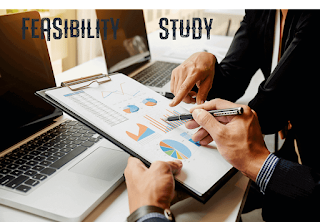What is a Feasibility Study? Why is it Important for Business? Content of Feasibility Study
Introduction
Launching a new project, whether it's a business venture, construction project, or any other initiative, is an exciting prospect. However, before jumping into a new endeavor headfirst, it's essential to conduct a feasibility study.
 |
| Feasibility Study Importance |
A feasibility study is a crucial step in the project planning process, providing valuable insights into the project's viability and potential for success. In this blog post, we'll explore the purpose and contents of a feasibility study, along with a detailed breakdown of each step in the process.
What is a Feasibility Study?
A feasibility study is a systematic assessment of the practicality, viability, and potential risks associated with a new project. This study is typically performed before a project's initiation to determine whether it's worth investing time, money, and resources. It helps stakeholders make informed decisions and set realistic expectations about the project's outcome.
A well-executed feasibility study can save an organization from committing resources to projects that are bound to fail.
The Contents of a Feasibility Study
A comprehensive feasibility study consists of several key components:
Executive Summary:
- An overview of the project, its purpose, and objectives.
- A concise summary of the study's findings.
- A recommendation to proceed or not with the project.
Project Description:
- A detailed explanation of the project's scope, objectives, and goals.
- Information about the industry, market, and competition.
Market Analysis:
- Market size and potential growth.
- Target audience and their demographics.
- Competitive landscape.
 |
| Feasibility Study Importance |
Technical Feasibility:
- Assessment of the project's technical requirements.
- Evaluation of technology and equipment.
- Potential technical challenges.
Financial Feasibility:
- Projected costs, including initial investments and ongoing expenses.
- Revenue projections and potential profit margins.
- Risk analysis, including sensitivity and risk-adjusted analysis.
Operational Feasibility:
- A study of how the project will integrate with current operations.
- Evaluation of human resource requirements.
- Logistics and supply chain considerations.
Legal and Regulatory Compliance:
- Examination of the legal and regulatory requirements.
- Potential licenses, permits, or certifications needed.
- Identification of potential legal risks.
Environmental and Social Impact Assessment:
- Evaluation of the project's impact on the environment and local community.
- Compliance with environmental regulations.
- Corporate social responsibility considerations.
Risk Analysis:
- Identification of potential risks and uncertainties.
- Risk assessment and mitigation strategies.
- Contingency plans for unexpected challenges.
Conclusion and Recommendation:
- A summary of the key findings from the study.
- A clear recommendation to proceed, modify, or abandon the project.
Now, let's break down the steps involved in conducting a feasibility study.
Steps in Conducting a Feasibility Study
Project Initiation:
- Define the purpose and objectives of the feasibility study.
- Appoint a project manager and assemble a cross-functional team.
Project Scope Definition:
- Clearly define the scope of the project, including what it aims to achieve.
 |
| Feasibility Study Importance |
Data Collection:
- Gather data on market trends, competition, technical requirements, financial data, and legal and regulatory information.
Market Analysis:
- Analyze market trends, demand, and competition.
- Identify target demographics and customer preferences.
Technical Feasibility:
- Assess the project's technical requirements and infrastructure.
- Evaluate the availability and suitability of technology and equipment.
Financial Feasibility:
- Estimate the project's costs and revenue projections.
- Perform a cost-benefit analysis.
- Consider financing options and assess the return on investment (ROI).
Operational Feasibility:
- Analyze how the project will integrate with existing operations.
- Assess human resource needs and training requirements.
Legal and Regulatory Compliance:
- Identify legal and regulatory requirements for the project.
- Determine the need for permits, licenses, or certifications.
Environmental and Social Impact Assessment:
- Evaluate the project's impact on the environment and local community.
- Develop strategies for mitigating negative impacts.
Risk Analysis:
- Identify potential risks and uncertainties.
- Develop a risk management plan, including mitigation and contingency measures.
Conclusion and Recommendation:
- Summarize the findings from each section of the study.
- Provide a clear recommendation to proceed, modify, or abandon the project.
Feasibility Report:
- Compile all the information gathered and analysis into a comprehensive report.
- Present the report to stakeholders for their input and decision-making.
Conclusion
Conducting a feasibility study is an essential step in the project planning process. It provides stakeholders with a comprehensive understanding of the project's potential risks, challenges, and opportunities.
By following the outlined steps and considering the key components of a feasibility study, organizations can make informed decisions and increase their chances of project success. Remember, a well-executed feasibility study is an investment in the future of your project, and it's better to uncover potential obstacles early rather than later in the project's lifecycle.
